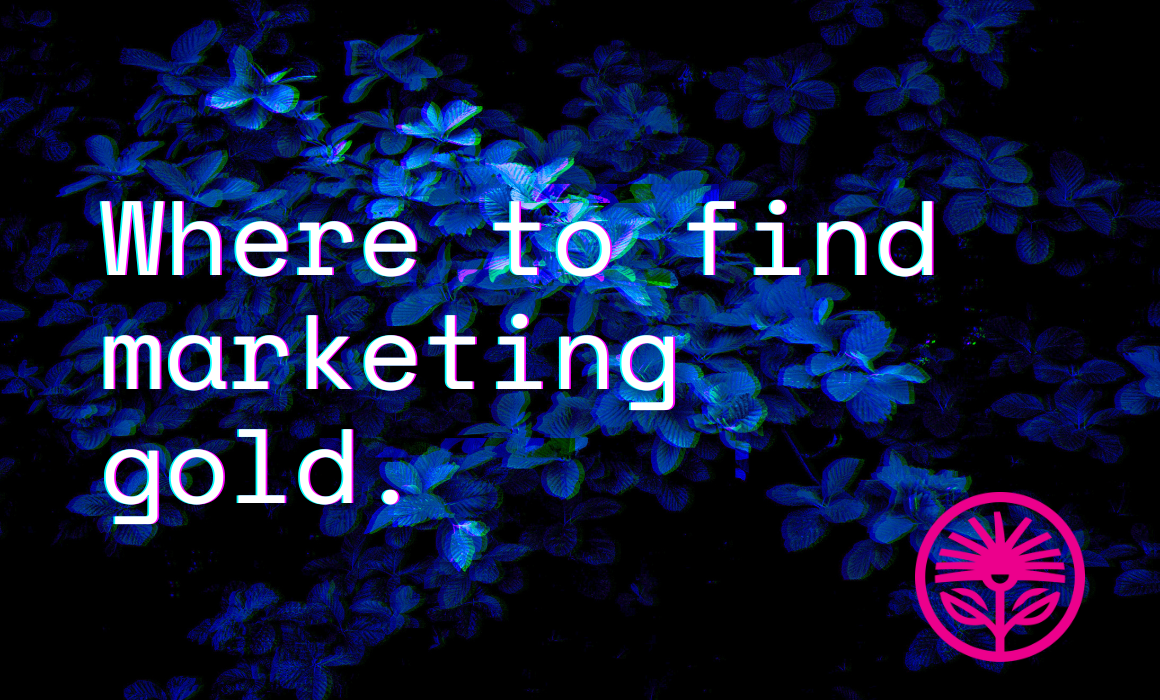Where to find marketing gold — Kelford Labs Weekly
It’s hiding in plain sight.


If you’ve spent much time with me, you’ve almost certainly heard me refer to something as “marketing gold.”
What I tend to mean by that is, at the root of all good marketing, there is value. All the clever language, brilliant designs, or innovative placements in the world won’t help us if, at the core of our marketing efforts, there isn’t real, credible value for our very best customers.
The value at the core of good marketing is gold. It’s the intrinsically valuable thing that people gravitate toward. The appearance of the marketing is merely polish—as Rosser Reeves wrote, “We must start with gold.”
But where do you find marketing gold? Well, there are rich veins we can identify by digging into what our current clients and customers say about us. Let’s explore how to find marketing gold by asking the right questions of our clients, and paying special attention to what they say.
I’ve identified three sources that I tend to recommend the most to entrepreneurs to search for value.
Let’s go through them one by one.
1) Heartbreaking Compliments
I’ve asked countless entrepreneurs the compliment they’d like to hear from their clients. A significant majority respond with the same desired praise: “I couldn’t have done it without you.”
That’s what most entrepreneurs want to hear. But the compliments they receive are often more specific, more measured, and, sometimes, more heartbreaking.
What I hyperbolically call “heartbreaking compliments” are the compliments you get about your work or your business that sort of make you feel… bad? Because, while you’re happy the client liked the work, you wish they’d noticed something else about it.
Have you ever been told, “You were easy to work with,” and wondered if that means that’s the only thing you’re good at? Or maybe you’ve heard something like, “That went better than I expected” and questioned whether you’re underselling your credibility and expertise.
In any case, I bet there’s a compliment you’ve received that didn’t actually feel all that good to get. But here’s the good news: That’s marketing gold.
Because the things our clients actually say about us—even if it’s not exactly what we want them to say—reveal where their priorities are. What they value. What they’re looking for.
Now, to make something of that gold, here’s what you do: You focus more of your marketing on the value your clients most easily perceive.
If you’re often told you’re “easy to work with,” that means your industry might have a reputation for being difficult, and you stand out from the crowd. Lean in to your ability to form relationships and focus more of your marketing efforts on your smooth, efficient, and articulate process. Your clients like that about you, and your prospects want to hear about it.
If you’ve been told that things “went better than they expected,” the client is telling you that other prospects aren’t buying because they don’t expect great results. To make something of this gold, the next step is to take a hard look at your current marketing—every customer-facing decision you make—and consider whether it matches the quality and sophistication of your services.
Whatever your particular “heartbreaking compliment,” identify what it says about what your clients are looking for and paying attention to, and find a way to make that a larger focus of your marketing.
2) Objection Reversal
Okay, so it’s one thing to ask your clients if they’d recommend you, and how they’d describe your value.
But, in my opinion, the real gold is hidden within this question:
“If you recommended me to a peer or friend, and they said I was [too expensive, too small, too slow, too insert-your-most-common-objection], what would you say?”
Now, of course, this question is best for customers and clients you have a great relationship with and lots of experience working with. But contained within their answer is the reason they chose you despite those potential objections.
They might say something like, “Sure, they’re pricier than the others, but that means they can take the time to do it right the first time.” Or, “they don't have all the staff of the bigger players, but that means you’re always working with their best.”
Now, the next time you’re in a sales conversation, you have an “admission against interest” to bring up—which is intrinsically credible—like, “I know we’re not cheap, but that’s so we can focus on a few clients at a time, instead of trying to fly through things as fast as possible.”
The reason your clients work with you despite a common objection reveals the gold—the fact that the common objection is actually a selling point, if you say it right.
3) Why’d it work this time?
Finally, chances are your clients aren’t buying your type of services for the very first time. If you’re a designer, it’s likely that the design you’re doing is replacing design somebody else did, for instance.
If you’re an accountant, chances are you’re not the first accountant your client has ever had.
So, when it’s time to interview your customers for testimonials or case studies, here’s what you can ask:
“I know I’m probably not the first person you’ve worked with on this, but it seems like you feel that you’re getting the results you wanted now. So, why’d it work this time? What went differently that you didn’t expect, or that made things easier for you?”
This will almost certainly reveal a handful of heartbreaking compliments which you can use, and it will also reveal aspects of your business that are valuable, but had been invisible to you.
Maybe it’s your team, or your particular way of working. Maybe it’s your philosophy, or your sense of humor. Maybe it’s your location, or your simple payment terms.
Whatever it is, it’s gold. And it had been hiding behind a simple question.
Looking for Gold
So those are three sources of marketing gold: heartbreaking compliments, objection reversals, and targeted inquisitiveness.
When your marketing is built on a valuable foundation, it makes your messages that much easier to create, and that much more likely to work.
Because they’re intrinsically attractive and worth their weight in, well, gold.
So, the next time you hear a “heartbreaking compliment,” identify the gold it’s pointing to. The next time you talk to a client about a referral, ask them how they’d overcome a common objection. And the next time you’re asking a client about the work you’ve done, find out why it worked this time.
The value you provide—and which you can demonstrate—is there. Sometimes, we just have to dig for it.
But that’s where we find the gold.
Kelford Inc. helps hands-on entrepreneurs and founders with complex marketing challenges define and articulate their unique value to their very best customers.
We’ll show you the way to always knowing what to say.



